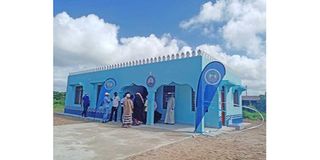Lamu gets first safe house for SGBV survivors

The newly opened Mokowe Safe House Centre for gender-based violence survivors in Lamu.
What you need to know:
- It was built in honour of former Public Works Principal Secretary Mariam El Maawy, through funding from the Kenya Ports Authority (KPA).
- PS El Maawy died in September 2017 at a South African hospital while undergoing treatment for injuries sustained in an Al-Shabaab attack on July 13 that same year.
A safe house has been commissioned at Mokowe in Lamu West, providing relief to sexual and gender-based violence (SGBV) survivors in Lamu County.
Construction of the facility, which is the first of its kind in the region, cost Sh6 million. It was built in honour of former Public Works Principal Secretary Mariam El Maawy, through funding from the Kenya Ports Authority (KPA).
PS El Maawy died in September 2017 at a South African hospital while undergoing treatment for injuries sustained in an al-Shabaab attack in the Milihoi area on the Lamu-Mpeketoni road on July 13 that same year.
The 10-bed capacity safe shelter is located within the compound of Mokowe Health Centre and will be receiving victims from across the county and providing free services.
In a statement during a handover ceremony, KPA acting managing director John Mwangemi noted that the establishment of such a facility in Lamu is historic as it will be a safe haven for SGBV victims.
Hope
Mr Mwangemi reiterated that the centre will give hope and a second chance to many girls who have been undergoing inhumane treatment at the hands of tormentors without having any place to run to.
There have been long cries from women and girls undergoing SGBV, with Hindi, Bar’goni, Mokowe, Mpeketoni, and Witu leading in cases reported. Violence against women and girls is a global human rights challenge.
The World Health Organization (WHO) estimates that 37 per cent of women worldwide have experienced physical and/or sexual violence in their lifetime.
According to Kenya national data published in 2014, about 41 per cent of women reported having experienced physical or sexual violence from their husbands or partners. About two-fifths of those women reported physical injuries from the violence.
And in Lamu, statistics from the County Gender-Based Report as registered by the public health facilities indicate that 327 cases of sexual violence were handled from 2015 to 2019.
“With these kinds of grim statistics and gender-based violence rising every day in this place, we can’t deny the fact that it’s an issue that needs to be addressed. And so when the authority received your request to construct this safe centre, we were eager to assist, knowing that we have joined a cause worth fighting for,” said Mr Mwangemi.
“It is our hope that through this spotlight initiative, communities will now report GBV cases and those affected will receive the much-needed help. And with those remarks, it’s now my pleasure to hand over the Mokowe Safe House to the community.”
Giving back to society
Woman Representative Ruweida Obbo thanked KPA for the donation, which is part of their corporate social responsibility. She noted that despite the Sexual Offences Act, SGBV victims in places like Lamu have continued to suffer at the hands of their violators as safe spaces for those affected had remained a mirage.
She expressed hope that with Mokowe Safe House Centre, Lamu survivors will for the first time get a home that provides them with alternative shelter.
Ms Obbo said the centre will keep “our GBV survivors away from perpetrators, with the aim of supporting them in dealing with the traumatic experience, as justice takes its course. We thank KPA for this noble course”.
Hindi MCA Anab Haji cited culture as a key hindrance to effective reporting of SGBV in the county. She was, however, quick to say that the facility will now help fast-track unearth cases. “I urge the many women and girls who have been suffering silently after being subjected to GBV to find solace here.”





